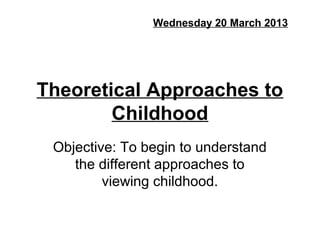Report
Share

Recommended
Recommended
More Related Content
What's hot
What's hot (20)
AS Sociology Unit 2 (Education) - Cultural Deprivation

AS Sociology Unit 2 (Education) - Cultural Deprivation
GCE Sociology Revision (AQA)- Unit 1 Theories of the family (3)

GCE Sociology Revision (AQA)- Unit 1 Theories of the family (3)
Culture and socialisation: Ties in with the CIE syllabus Unit 2

Culture and socialisation: Ties in with the CIE syllabus Unit 2
GCE Sociology Revision (AQA)- Unit 2 Education- Ethhnic differences in achiev...

GCE Sociology Revision (AQA)- Unit 2 Education- Ethhnic differences in achiev...
Educational underachievement external & internal factors

Educational underachievement external & internal factors
Family and Household: Influence of Postmarital Residence

Family and Household: Influence of Postmarital Residence
Sociological perspectives and the social construction of childhood

Sociological perspectives and the social construction of childhood
Viewers also liked
Viewers also liked (9)
Similar to Theoretical approaches to childhood
Similar to Theoretical approaches to childhood (20)
Identifying and caring for red flags when working with teens

Identifying and caring for red flags when working with teens
Shifting public perceptions of childhood obesity as part of a long-term appro...

Shifting public perceptions of childhood obesity as part of a long-term appro...
Developmental Psychology Presentation (socioemotional development)

Developmental Psychology Presentation (socioemotional development)
Jukka Mäkelä: Raising children: The past, the present and the future

Jukka Mäkelä: Raising children: The past, the present and the future
More from smccormac7
More from smccormac7 (20)
Theoretical approaches to childhood
- 1. Wednesday 20 March 2013 Theoretical Approaches to Childhood Objective: To begin to understand the different approaches to viewing childhood.
- 2. Recap from last lesson • Nick Lee ‘Childhood in an Age of Uncertainty’. • 20th Century view – Adults are stable, complete, fully rational, they have become – Children are unstable, incomplete, not fully rational and are becoming • 21st Century view – Adults have become more like children in that they are constantly redefining themselves, work and relationships are no longer for life and therefore adults are not complete • Children are seen as people in their own right.
- 3. Two Main approaches to viewing childhood: Th e The conve ative ltern ch ntion a appro al ap proa ac h
- 4. The Conventional Approach • This view is linked to many functionalists and New Right thinkers • Children are vulnerable and need protection form the adult world. • Single mothers can be ‘blamed’ from problems in society as they do not provide the ‘right’ or ‘ideal’ way to raise a child • Homosexuality and media violence are seen as threats to innocent children
- 5. Melanie Phillips • Her book ‘All must have prizes’ 1997 • She argues that culture of parenting has broken down and the innocence of childhood is being undermined by 2 trends: – Liberal ideas have distorted the concept of parenting – The media and peer group are more influential than parents • Childhood is therefore shortened. Adulthood encroaches on the experience of children a great deal earlier than in the past. • As a result social problems e.g. self harm, drug / alcohol abuse, suicide, eating disorders, depression are on the increase
- 6. Sue Palmer • Her book ‘Toxic Childhood’ (2007) • Adults have benefited from improved technologies / wealthier society. • But these advances have harmed children who no longer get traditional parenting methods (stories, reading, quality time) • Instead parents are too happy to use tv, electronic games and junk food to keep children quiet. • ‘every year children become more distractible, impulsive and self-obsessed – less able to learn, to enjoy life, to thrive socially.’
- 7. ‘Children as Consumers’ • This is a trend which is alarming some sociologists as it is on the increase • Children aged 7-11 are worth about £20 million a year as consumers • Advertisers have therefore targeted children in order to encourage ‘pester power’.
- 8. There are 3 related concerns: 1. Commentators hark back to a ‘golden age’ of childhood – less pressure less complex. The consumer-orientated society we have now sees children as manipulating their parents. Pugh (2002) ‘consumption as compensation’ parents are ‘cash- rich but time-poor’ spending alleviates guilt. 2. Evans and Chandler (2006) peer pressure was an important factor in consumption. Name-calling and bullying would ensue if the latest trend or label wasn’t followed. (Poorer families felt this pressure most.) 3. Advertising aimed at children is often ‘anti-adult’ making rebellion appear ‘cool’. It’s argued that this undermines parental authority and contributes to perceived increase in anti-social behaviour amongst children.